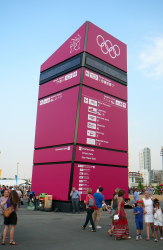
John D. Henry
BA BSc

ARTICLE
- Team GB and London 2012 OlympicsReflections on the hugely successful hosting and sports process by Great Britain in the 2012 Olympics.
Achievements and Glory of Team GB and London 2012 Olympics
Click images to view larger picture, click on large image to view slide show.

2012 will go down in history as a tremendous year for Great Britain. The Queens Diamond Jubilee led the way with a popular and well staged celebration. The London 2012 Olympics proved many critics wrong. The event was extremely well organised, and Team GB's achievements in both Olympics and Para Olympics rated as third in the world, with only the United States of America and China (far larger countries) coming higher. The author's son Matthew Henry was a medal co-ordinator in these Olympics, hence providing a unique chance to photograph and video the Opening Ceremony rehearsals.

2012 will go down
as a great year for Britain. The Queen’s Diamond Jubilee was a stunning event
and reaffirmed the United Kingdoms underlying patriotism; often in recent times
suppressed due to the dark forces of politically correct ideology. Prior to the
Olympics Britain Bradley Wiggins stunned the world, and especially the French by
winning the 2012 Tour de France. And Scotland’s Andy Murray had a great year at
tennis, albeit just missing out in the Wimbledon 2012 final - he won just about
everything else.
Bradley Wiggins stunned the world, and especially the French by
winning the 2012 Tour de France. And Scotland’s Andy Murray had a great year at
tennis, albeit just missing out in the Wimbledon 2012 final - he won just about
everything else.
The author, on the
run up to the Olympics admits to a high degree of scepticism, albeit when they
rigged up
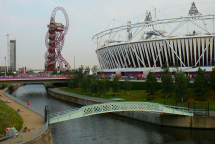 an airport type scanner Olympic voting machine at Charlton Athletic
football team, the author duly walked through and voted. On 6th July 2005 the
announcement was made that London was selected to host the 2012 Olympics, this
appeared great news, but admittedly many problems were envisaged.
an airport type scanner Olympic voting machine at Charlton Athletic
football team, the author duly walked through and voted. On 6th July 2005 the
announcement was made that London was selected to host the 2012 Olympics, this
appeared great news, but admittedly many problems were envisaged.
The main problem predicted was that the London Olympics could prove an irresistible target for terrorism. The UK has allowed plenty of enemies to enter the country, and as the normal objective for terrorism is to attract publicity, the Olympics were seen as an obvious target. The other worry was whether the games will become an overtly politically correct circus, and simply an exercise in celebrating diversity.
One of the first Olympic tasks was the design of the Olympic Logo, this was back in 2007. This cost a lot of money to design, over half a million pounds apparently. And the design in the author’s view was utter rubbish, deeply unpopular, and to be frank should have been confined to the dustbin immediately upon conception. Some of its idiosyncrasies’ such as the lower case ‘l’ in London, were quietly corrected when rebranded onto banners.
Leading up to the London 2012 Olympic Games were numerous news stories of ‘Olympic Traffic Lanes’ causing motorists misery, and how small businesses were adversely affected by overzealous implementation of sponsorship copyright. There was even a story of a baker who was not allowed to arrange doughnut rings in the classic Olympic five ring array.
However it was the
security company G4S that descended the whole lead-up into farce. They were
contracted to provide 10,400 security
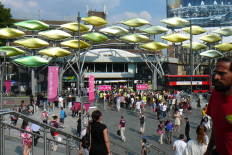 personnel; and it was soon evident there
was a significant shortfall of less than half that number available. The
quality of some people selected and training provided, left a lot to be
desired. Also politically correct ideology appeared to take over the selection
process; hence G4S even employed some country hating religious extremists to
guard the security of the games. The author personally saw some of the G4S
staff, and to be frank some looked as though they didn’t have a clue regarding
basic security (the author has a certain expertise by virtue of Royal Navy
service).
personnel; and it was soon evident there
was a significant shortfall of less than half that number available. The
quality of some people selected and training provided, left a lot to be
desired. Also politically correct ideology appeared to take over the selection
process; hence G4S even employed some country hating religious extremists to
guard the security of the games. The author personally saw some of the G4S
staff, and to be frank some looked as though they didn’t have a clue regarding
basic security (the author has a certain expertise by virtue of Royal Navy
service).
The lead up to to
the Olympics showed the inevitable spoof television series, and in the UK’s case
this was aptly named ‘Twenty Twelve’. The programme’s portrayal of committee
meetings and characters satirised so much of real life, and the concepts such as
the backward counting Olympic Clock, the coach of athletes and officials which
got lost, the translator translating Hugh Bonneville’s carefully practised
Brazilian back into English, and navigating flights over motorways presented
great humour. Twenty Twelve provided a great prelude on the lead up to the
Olympic Games, and bizarrely some of its most outrageous humour (such as the
lost coach) became realities.
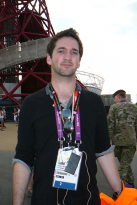
To be fair the Olympics from a logistics angle appeared to be going to plan, certainly no worries akin to the problems Greece had when they hosted the 2004 Olympics, which was littered with well publicised construction delays. Even the G4S debacle ended up as a positive, as the UK brought the military in to fill in the disgraceful shortfall. The Royal Navy (Senior Service), Royal Marines, RAF, and of course the predominantly Army personnel did a brilliant job and in the process won the hearts of the public. The author saw with his own eyes how efficient the military personnel conducted a security check in on entering Olympic Park. This gave great confidence that security was in hand, and at the same time the military guys and girls were friendly, endearing themselves to the public as they entered. The overall impression was a security check far more efficient than any Airport security encountered, to be fair there were a few G4S personnel, but they were in the background keeping well out of the way.
The author’s son Matthew Henry was employed during the Olympics, in his profession he works behind the scenes as stage manager (or assistant). His jobs have include the West End show ‘Le Cage Aux Follies’ and the touring ‘An Inspector Calls’ directed by Stephen Daldry CBE (who was assigned head of Olympics ceremonies). Matthew assisted co-ordinating the London Olympics medal ceremonies, and when he offered tickets to the author and wife for the dress rehearsal of the Opening Ceremony we metaphorically bit his arms off!
On 25th July 2012
the author and wife travelled up to London via train towards Stratford. The
overall impression was one of clockwork
 efficiency. The purple theme, together
with co-ordinated citation ‘London 2012’ (in correct title case unlike the logo)
looked great. The rail system seemed well organised and at Stratford station
military personnel were in abundance, and very efficiently organising the mass
of people arriving. A special mention also to the numerous volunteers that were
assisting - these tended to be either young (students) or older (retired) - this
unlikely combination provided an absolutely first class service.
efficiency. The purple theme, together
with co-ordinated citation ‘London 2012’ (in correct title case unlike the logo)
looked great. The rail system seemed well organised and at Stratford station
military personnel were in abundance, and very efficiently organising the mass
of people arriving. A special mention also to the numerous volunteers that were
assisting - these tended to be either young (students) or older (retired) - this
unlikely combination provided an absolutely first class service.
The Olympic area and stadium looked suitably impressive, and Matthew gave an insightful quick tour of the area. It really felt special, the sight of the numerous world TV companies and studios set-up added to the general positive impression. The overall impression was of an extremely well conceived, instigated, and organised event commensurate with the importance of such an international event, with the eyes of the world waiting to watch.
 The Opening
Ceremony was stunning to behold, some argued that the Director Danny Boyle had
included various subliminal socialist messages, but the author’s firm view was there
was just about something for everyone. The UK were never going to compete with
the sheer spectacle of the Beijing Olympics, but what was produced was quirky,
spectacular in its own right, and very quintessentially British. The world were
truly given a generous sampler of the best of British, and the many highlights
included the hilarious Mr Bean, the Queen in her first acting role, and the
glorious sight of the industrial towers appearing to come from nowhere, and the
‘molten’ giant rings forming themselves into the Olympic logo accompanied by
live haunting Mike Oldfield music.
The Opening
Ceremony was stunning to behold, some argued that the Director Danny Boyle had
included various subliminal socialist messages, but the author’s firm view was there
was just about something for everyone. The UK were never going to compete with
the sheer spectacle of the Beijing Olympics, but what was produced was quirky,
spectacular in its own right, and very quintessentially British. The world were
truly given a generous sampler of the best of British, and the many highlights
included the hilarious Mr Bean, the Queen in her first acting role, and the
glorious sight of the industrial towers appearing to come from nowhere, and the
‘molten’ giant rings forming themselves into the Olympic logo accompanied by
live haunting Mike Oldfield music.
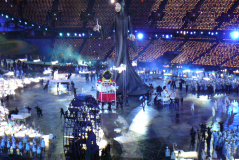 he NHS sketch
with actual nurses and doctors was good fun, albeit may have perplexed some
overseas viewers. This supplied an appropriate backdrop for some great cameos
themed with Mary Poppins and Harry Potter. The show proceeded onto a
celebration of British music, and the house on set lifted to reveal Sir Tim
Berners-Lee the inventor of the World Wide Web. Britain may be a small island
nation, but its contribution to the world is immense.
he NHS sketch
with actual nurses and doctors was good fun, albeit may have perplexed some
overseas viewers. This supplied an appropriate backdrop for some great cameos
themed with Mary Poppins and Harry Potter. The show proceeded onto a
celebration of British music, and the house on set lifted to reveal Sir Tim
Berners-Lee the inventor of the World Wide Web. Britain may be a small island
nation, but its contribution to the world is immense.
From the moment of this terrific opening ceremony the author was an immediate convert to the spirit of the London Olympics, and what a tremendous event for Great Britain it proved to be. The achievements were incredible, and bearing in mind the benchmark is absolute, namely the best in the world under controlled conditions. Team GB won 29 Gold Medals; including Bradley Wiggins for time trial cycling (he also won Tour de France in 2012), Andrew Murray at Tennis, and during one of the best ever sporting nights for Great Britain a trio of gold medals for Mo Farah in the 10,000 metres, Greg Rutherford in the long jump, and golden girl Jessica Ennis in the Heptathlon to name but a few of the achievements. Overall Team GB is to be highly commended for what amounting to a stunning team performance. Great Britain came third in the main Olympics and also in the Para Olympics - given the size of the British Isles words cannot express the incredibility of this outcome.
In the aftermath of Great Britain’s tremendous achievement, it was noted that the European Union tried to claim Britain’s entire haul of medals for its own propaganda uses. Indeed on the site www.medaltracker.eu the European Union had the cheek to place it at the top of the Olympics medal chart ahead of United States and China. The author certainly doesn’t remember seeing any Euro flags at the Olympics, albeit just about every other nation’s was there. To assist the European Union here is a very simple chart, to clarify matters:-
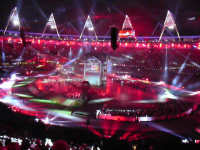 1st United
States
1st United
States
2nd China
3rd Great Britain
- And top country out of all of Europe.
6th or Below - any
other European Country starting with Germany.
If the European Union wants to play silly games with the medal table, then it is noted that a joint USA and GB team would come top of the table, even allowing for the EU hijacking GB’s medals!
More seriously it is concluded that the London Olympics, including the Para Olympics ultimately was well organised, with impressive Opening and Closing ceremonies - and an outstanding array of achievements from the GB Team athletes resulted in an extremely commendable 3rd place in the World for both the standard and Para Olympics. Overall for the British Isles this was probably the most memorable sporting year since England won the Football World Cup in 1966, and many would argue that the 2012 Olympics was even greater than that.
In the aftermath of the Olympics, Datalite trading as Frames Online Bulk Supply (www.dataliteframes.co.uk) supplied a number of companies with picture frames for their Olympic memorabilia products. For a while stocks of gold frames in view of GBs success were depleted!

John D Henry BA BSc, Managing Director of DATALITE UK LTD
Picture Frames and Personalised Gift Products at www.dluk.info

